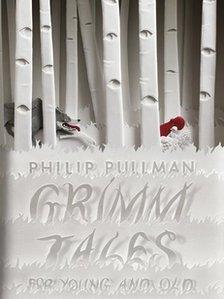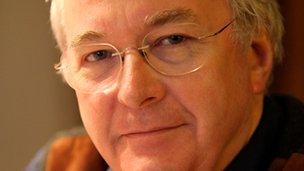Philip Pullman turns to Grimm task
- Published

Each story is accompanied by a brief commentary on its background
Author Philip Pullman is best known for his award-winning Dark Materials Trilogy. Its third instalment, The Amber Spyglass, was the first children's book to win the prestigious Whitbread Prize, in 2002.
Over the past year, Pullman has taken a break from writing a companion novel, The Book Of Dust, to the series, to put his own spin on 50 of Grimms' classic fairytales.
Having previously written versions of Puss in Boots and Aladdin, as well as four original fairytales, it is not uncharted territory for the writer.
"You could say I'm in the fairytale business," he says.
"Penguin Classics asked me to do it and obviously I leapt at it."
First published in 1812, The Grimm Brothers' Children's and Household Tales was written by German siblings Jacob and Wilhelm Grimm.
The brothers collected their folk tales from friends and old books, and many date back thousands of years.
They are now available in more than 100 languages and the brothers' versions of the stories have been adapted for the screen in films such as Disney's Snow White and the Seven Dwarfs, Sleeping Beauty, and Cinderella.
Pullman says he has always "loved" the Grimm stories but did not struggle to whittle down their compendium of over 200 tales, to reach his tally of 50.
'Wonderful story'
"They are not all of the same quality," he says. "Some are easily much better than others. And some are obvious classics. You can't do a selected Grimms' without Rumpelstiltskin, Cinderella and so on."
Pullman included some more obscure tales, too.
"I chose the stories that appealed to me very strongly because they had a force, a strength and a structural integrity, like The Robber Bridegroom, The Three Snake Leaves and Hans My Hedgehog," he explains.
The Three Snake Leaves, about a man who brings his wife back to life before she and her lover murder him, is one of his favourites: "It's a wonderful story, so vigorous."
Pullman believes The Grimm Brothers' fairytales are enduring because "they were quite discriminating... the people they chose to listen to were good storytellers."

Pullman said he is "very superstitious" when he works. "I always use the same pen, the same notebook."
He acknowledges the brothers were also lucky with their timing.
"If somebody this week suddenly thought of a book that dealt with sado-masochism among the business class, they'd have missed the bus as it's already been done," he jokes, referring to erotic novel Fifty Shades of Grey.
"But the Grimms were first listened to in 1812 at a time when people were very interested in Germany, the roots of the German nation, German culture and German language," he explains.
"It was part of the movement to bring German-speaking people together and it was one of the first collections of that sort anywhere in Europe."
Pullman is keen to point out that his re-versioning is "Grimm not Pullman" and that all he really wanted to do was to simply "get back to the story and just tell it in modern language".
Readers should certainly not expect a radical, contemporary collection.
"We can all name people who've done very good jobs on traditional tales - for example, Benjamin Zephaniah's version of Tam Lyn, the old folk song. It's very good but that wasn't the sort of job I was taking on.
"I may well go back to some of these stories and do them in the more personal version," he says.
Pullman does not change endings or plot although he does include brief notes at the end of each story which suggest changes where he feels it necessary.
And, unlike many fairytale collections, this one does not contain pictures.
Penguin Classics are never illustrated but Pullman says that is not the only reason.
"I don't think illustrations tell the right kind of story or add the right kind of atmosphere," he says.
"Illustrators typically turn them (the characters) into people - I don't think they are people, I think they're masks.
"There's no psychology in a fairytale. You don't need to go into people's back stories and talk about motives. Looking at other people's adaptations, I realised what I'd like is a very swift telling that doesn't clutter it up with description."
Fans will be pleased to hear that Pullman is back writing The Book Of Dust, the third companion book to accompany His Dark Materials, now Grimms' Tales is finished.
Pullman says he hopes to take on board the brevity of fairytale language - the lack of adverbs for example - in the new book.
When can we expect to see it published?
"I can't tell you, but I've got 220 pages written so far. It's coming along... it will be a while yet but it is growing."
Grimm Tales for Young and Old is published by Penguin Classics on 27 September 2012.
- Published2 September 2012
- Published20 May 2011
- Published14 August 2010